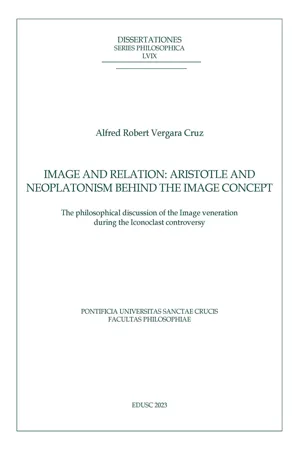
eBook - ePub
Image and relation: Aristotle and Neoplatonism behind the Image concept
The philosophical discussion of the Image veneration during the Iconoclast controversy
- 209 pages
- English
- ePUB (mobile friendly)
- Available on iOS & Android
eBook - ePub
Image and relation: Aristotle and Neoplatonism behind the Image concept
The philosophical discussion of the Image veneration during the Iconoclast controversy
About this book
The concept of the image has always held a significant place in human existence and philosophical contemplation. Beyond its artistic value, images have played a crucial role in humanity's relationship with the divine. This connection is particularly evident in Eastern Christianity, where the veneration of images became a common practice. However, this usage also brought forth challenges, especially during Christianity's early years, leading to the Iconoclast controversy of the eighth century. Some individuals viewed the use of images as a form of idolatry due to its roots in Greek pagan culture. Nevertheless, this controversy became an opportunity to delve deeper into the essence of the image. While theological arguments were central to the defense of images, a study of the controversy's documents, including the arguments of prominent image defenders such as John Damascene, Nicephorus of Constantinople, and Theodore the Studite, revealed that a crucial issue lay in the different understanding of the relationship between image and prototype.
They referred to the Aristotelian category of relation, which had a history of Neoplatonic influence, to defend such relation. Rather than identifying the image with the prototype, as in the case of idolatry, they argued that the two were similar. The image served as a means to lead one to the prototype, the true object of veneration. Consequently, the consideration of the image extended beyond the theological realm and encompassed philosophical perspectives as well. This study's findings do not pretend to reduce the concept of the image to its philosophical aspect. Within a broader context, the dominant Christian influence remains evident, resulting in a more profound and intricate relationship between the image and its prototype.
Frequently asked questions
Yes, you can cancel anytime from the Subscription tab in your account settings on the Perlego website. Your subscription will stay active until the end of your current billing period. Learn how to cancel your subscription.
No, books cannot be downloaded as external files, such as PDFs, for use outside of Perlego. However, you can download books within the Perlego app for offline reading on mobile or tablet. Learn more here.
Perlego offers two plans: Essential and Complete
- Essential is ideal for learners and professionals who enjoy exploring a wide range of subjects. Access the Essential Library with 800,000+ trusted titles and best-sellers across business, personal growth, and the humanities. Includes unlimited reading time and Standard Read Aloud voice.
- Complete: Perfect for advanced learners and researchers needing full, unrestricted access. Unlock 1.4M+ books across hundreds of subjects, including academic and specialized titles. The Complete Plan also includes advanced features like Premium Read Aloud and Research Assistant.
We are an online textbook subscription service, where you can get access to an entire online library for less than the price of a single book per month. With over 1 million books across 1000+ topics, we’ve got you covered! Learn more here.
Look out for the read-aloud symbol on your next book to see if you can listen to it. The read-aloud tool reads text aloud for you, highlighting the text as it is being read. You can pause it, speed it up and slow it down. Learn more here.
Yes! You can use the Perlego app on both iOS or Android devices to read anytime, anywhere — even offline. Perfect for commutes or when you’re on the go.
Please note we cannot support devices running on iOS 13 and Android 7 or earlier. Learn more about using the app.
Please note we cannot support devices running on iOS 13 and Android 7 or earlier. Learn more about using the app.
Yes, you can access Image and relation: Aristotle and Neoplatonism behind the Image concept by Alfred Robert Vergara Cruz in PDF and/or ePUB format, as well as other popular books in Philosophy & Ancient & Classical Philosophy. We have over one million books available in our catalogue for you to explore.
Information
Topic
PhilosophySubtopic
Ancient & Classical PhilosophyTable of contents
- TABLE OF ABBREVIATIONS
- INTRODUCTION
- Chapter I: THE PRESENCE AND THE ORIGINS THE IMAGE
- Chapter II: SOME PROBLEMS WITH THE IMAGE
- Chapter III: THE PRINCIPAL DEFENDERS OF THE IMAGE: A DEEPER PHILOSOPHICAL PERSPECTIVE
- Chapter IV: THE RELATION BETWEEN IMAGE AND PROTOTYPE: AN ANALYSIS OF THE PROBLEM
- CONCLUSION
- Annex 1: John Damascene’s Philosophical Chapter
- Annex 2: Direct Philosophical Citations
- BIBLIOGRAPHY